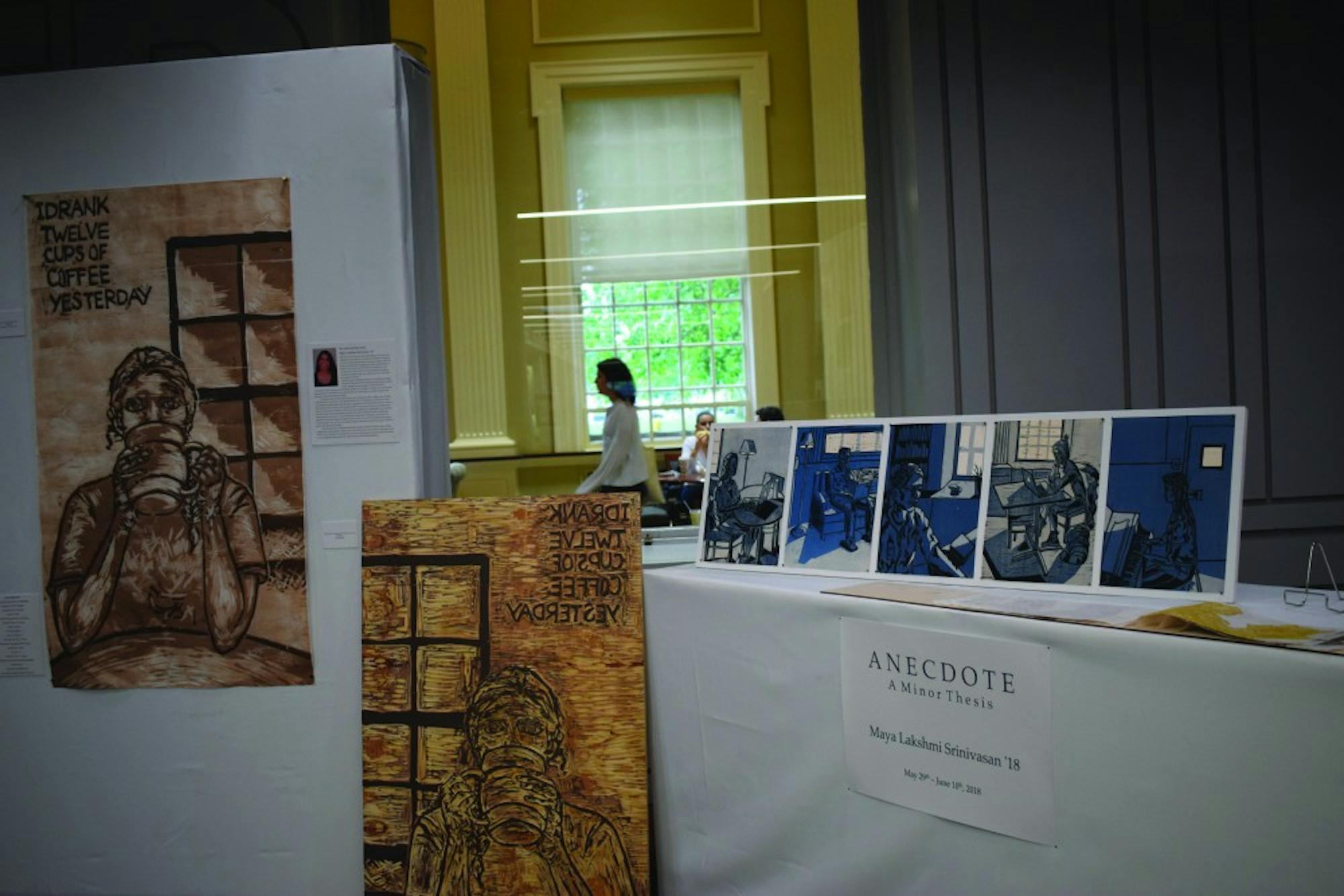As her sophomore year at the College came to a close, AnnClaire MacArt ’18 was considering a psychology major and an education minor. She graduates this weekend, nearly two years later, having completed a slightly different academic trajectory — an English major modified with religion.
MacArt is one of an ever-growing number of Dartmouth students choosing to modify their majors, an option that allows students to take courses in one primary field and one or more secondary fields as they pursue a degree. This option is intended to fit the needs of students who have an interest in one major program but are also interested in a specific problem or topic, the study of which depends on courses in related fields.
Students pursuing modified majors take at least six courses in their primary department or program and at least four in a second field. This path results in a “Type A” modified major — for instance, “classical studies modified with history.” In some cases, however, students can spread the four secondary courses over different departments or programs, earning a “Type B” modified major. This appears on permanent records as, for example, “psychology modified.” In either case, students must submit a statement to the involved departments or programs, as well as to the Office of the Registrar, explaining how their modified major represents an intellectually coherent course of study.
MacArt decided to pursue her “Type A” modified major after taking a religion class on the New Testament, which she said showed her a new, more academic way of reading scripture. She said she had always enjoyed writing, and therefore decided to pursue an English major modified with religion. She added that combining her interests in religion and English developed into a more personal course of study.
“I was interested in biblical texts, so I saw the overlap between studying religious literature and literature in the English department,” MacArt said. “That has, for me, gone in a direction where I can explore spirituality through writing.”
This type of individual experience is exactly what the modified major option promotes, according to assistant dean of faculty for pre-major advising Cecilia Gaposchkin. She said that modified majors are specifically designed to capitalize on the ways different disciplines overlap and “bump up against one another.”
“We want students to pursue their own developing intellectual interests, and that might not exclusively be contained within a discipline,” Gaposchkin said. “We want them developing their own interests and passions, and the modified major allows the flexibility to have a student find their own course of intellectual pursuits.”
Madeleine Yi ’18, who pursued an engineering major modified with economics during her time at Dartmouth, echoed this sentiment.
“No subject exists in a vacuum,” Yi said. “You can’t learn one subject without previous knowledge of others, and that’s why I think a modified major is such a good thing that Dartmouth offers. It gives students the opportunity to bring out different sides of subjects.”
Yi came to Dartmouth knowing she wanted to study engineering and decided to introduce an economics component to her coursework after taking Engineering Sciences 21, “Introduction to Engineering.” Throughout the course, she and a group of other students worked on a design project, utilizing fields such as mathematics, economics, management and communication.
“What I realized [in ENGS 21] is that there are so many other things involved in engineering besides being creative and coming up with the design,” Yi said.
After her experience in ENGS 21, Yi decided to take some introductory economics courses and eventually moved on to more advanced economics coursework with an international focus.
“It did complement engineering nicely,” Yi said. “I was really interested in structural and mechanical engineering, and we worked with a lot of different materials, from wood to different types of metal. With international markets, I found I was learning about what causes fluctuations in the price of different raw materials, and it was interesting to see it from both sides – why we might need certain materials for buildings, and then why we might not use them because of cost fluctuations.”
After graduation, Yi will continue to explore the connection between engineering and economics through engineering consulting at WSP, an engineering professional services firm.
Yi explained that her modified major was relatively easy to pursue because modifying engineering with economics is common. Professor James Feyrer, vice-chair of the economics department, described a few similarly common tracks: economics modified with computer science, economics modified with mathematics and economics modified with psychology.
“There are certain sets that are easy to approve because of the commonalities between the two fields,” Feyrer said. “For example, economics modified [with] math; economics is a mathematical discipline.”
In a testament to the growing popularity of modifying majors at Dartmouth in recent years, Feyrer added that out of the 200 or so economics majors who graduate each year, more than 30 chose to modify their major.
Sarah Salzman ’18 pursued two “Type B” modified majors at the College: economics modified and anthropology modified. She modified her economics major by choosing to focus on global development, taking courses in government, geography and international studies. To modify her anthropology major, she took classes in history; women’s, gender and sexuality studies; engineering; and psychology, this time focusing on global health.
Salzman said she decided to pursue modified majors to gain a more interdisciplinary focus in her studies. She wanted to expand beyond just one department’s mentality and bring in ideas from other fields.
“[I would recommend a modified major to] anyone who has an interest within a department that doesn’t completely align with what the major offers,” Salzman said. “You can make it work for what is most exciting for you. It enables you to be the most passionate about your studies.”
Eileen (Eily) Brady is a '21 from Chicago who studies government and romance languages. Eily loves travel, politics, iced tea and her dogs, Mac and Charlie. She is thrilled to be reporting the news for The Dartmouth.




